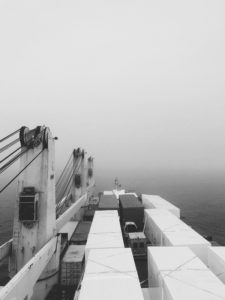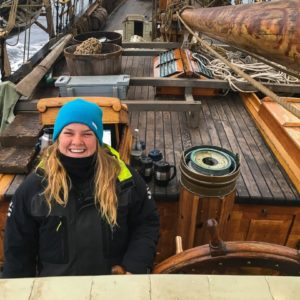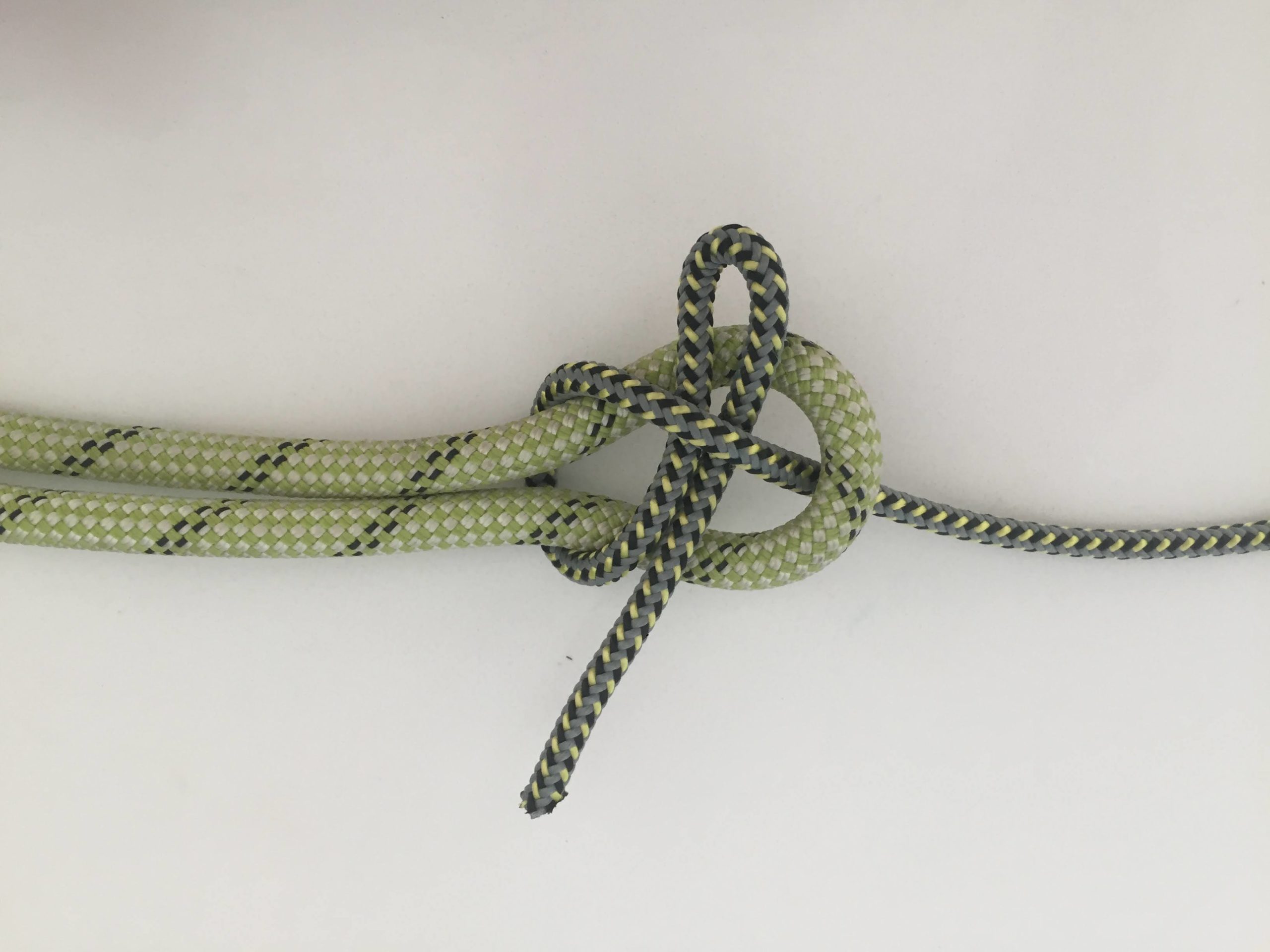Why did you choose to pursue a marine career?
Well, I always had a love for the ocean, ever since I first went out to sea at 14 years old. There’s something about the unknown, the ocean and the adventure that keeps bringing me back. It’s an itch that has never gone away since the first day I went out with my father. I also have a lot of family history involved in the marine industry going back to my grandfather who built wooden boats with his two brothers. My father is a fisherman along with both his brothers and most of my family on his side, it makes me proud to keep it going into the next generation. I would love to work on the ocean for the rest of my life.
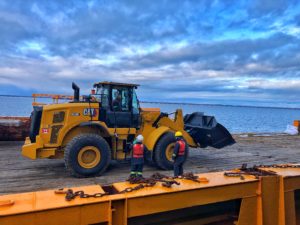
What school are you attending?
I’m currently enrolled at the Nova Scotia Community college, at the Nautical Institute in Port Hawkesbury. I am in my third and final year of the Marine Navigation Technology Program.
What is your position now? What position would you like to obtain in the future?
Right now, I’m a deck cadet but I’m hoping to obtain my mates ticket this upcoming spring. I’d like to eventually become a captain of a cargo ship or possibly an ice pilot in the future.
Where are you hoping to work when you finish school?
I am hoping to work for the Canadian commercial company Desgagnés. I really love the type of work they do with their vessels, especially the north going fleet. I know the Arctic is not a place that many people get to experience and adventure out to. Working with Desgagnés will allow me to travel all across the Maritimes and Quebec.
Do you have any advice for those who are thinking about pursuing a maritime career?
Work hard and never give up, because once you do succeed it will be an incredibly fulfilling career. It will be full of wonderful adventures, beautiful sights and amazing people that you will get to meet along your journey.
What originally sparked your interest to go and pursue a career at sea?
I was in grade 12 and I was applying to universities. I was accepted into civil engineering at three different universities in Nova Scotia but once I received those acceptance letters it dawned on me. Is this really what I would like to do for the rest of my life? The answer was no.
I am good in mathematics, but I realized a career in civil engineering wasn’t what was going to make me happy in life. So, I looked up to my cousin, Cory Deveau who is now the captain of the Bella Desgagnés. He has an amazing career, and it was really something that interested me, so I began doing research on how to obtain my mate’s ticket. I soon applied for the Marine Navigation course at the Nova Scotia Community College. I have never once regretted my decision. It is the best decision I have ever made in my life. It’s for certain the job of my dreams.
How long have you been working at sea?
I started going fishing on occasion with my father, uncle and cousin at the age of 14. I have been working on big commercial cargo vessels for three years, ever since the age of 18.
What type of vessels have you worked on?
I’ve worked on a lobster fishing vessel in the past. For my first placement I worked on the Argentia Desgagnés for four months and I’ve also spent two months onboard the Acadia Desgagnés. I am currently working for the full four-month Arctic season on the Nordika Desgagnés.
What is the work like on a commercial cargo vessel?
Depending on if you’re sailing on the ocean, at the dock or taking part in cargo operations the hours and type of work may vary largely.
As a Deck Cadet, I find the navigation part in the bridge while you’re sailing will take up less time in your day. You’re really only expected to be standing your scheduled watch plus a couple extra hours doing your other deck tasks.
In port or during cargo operations you will likely see really long days depending on the type of the vessel you’re on. For example, bulk cargo is less physically demanding work compared to general cargo. Regardless, while you’re in port loading the vessel, you will work long hours to ensure that the ship is properly loaded.
BULK CARGO VESSEL – With the loading and unloading operations on a bulk cargo ship your work will be very dependent on the type of bulk cargo ship you are on. Straight back loading ships don’t have any unloading gear onboard so you will usually use all shore-based equipment to load and unload the ship. You may also find a ship that will have cranes or derricks onboard to do the loading operations. In this case you generally have crane men who will come onboard to unload. With both of these types of ships you are looking at 20-30 hours in port to completely load or unload the vessel.
SELF-UNLOADING VESSEL – Self-unloaders however are very fast and efficient. They are equipped with cargo-handling equipment onboard and as the name suggests, they are automated to do most of the work for you. It can take approximately 12 hours to fully load or unload the ship but because of this, you may visit several ports in a short period of time. This can make for longer working days.
During general cargo operations there is a lot more work involved than we may think – lashing, securing and placement of cargo. Extra precautions are taken to ensure the vessel maintains constant stability. You also must consider dangerous goods that you may be loading onboard. The dangerous cargo needs to be separated and segregated from other cargo, which may react. With general cargo you will find that the crew does most of the loading and unloading. On occasion the ship may bring in extra stevedores to help with the operations. Depending on how many ports you will visit, you could be unloading a percentage of the cargo for 5-6 hours. On the other hand, you could be unloading the entire vessel for a week. Visiting multiple ports can be very tiring. You are not only taking part in cargo operations, but you will also help with mooring or anchoring operations as well as other essential deck work. You may have less than a day in between ports so you will end up working long hours for an extended period of time.
TANKER VESSEL – You could also work on a tanker vessel. Tankers have a much easier loading and unloading process because you simply hook up the shore pipeline to the manifold on your vessel. In my opinion, what I see as a downfall of working on a tanker is that the fact that you don’t generally visit docks, you go to terminals instead. As a consequence, you don’t see as much of the shore lifestyle as say you would with general or bulk cargo ships. Terminals are generally farther away from any city or town.
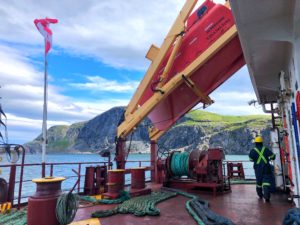
RANKING – In addition, your rank onboard the vessel will have an affect on your hours of work.
Generally the Chief Mate will see the longest work hours. They’re in charge of the cargo operations and they must ensure the vessel’s stability is being maintained at all times. This is especially true during loading and unloading. They are generally awake for most of the operation, with the exception of allowing time for required rest hours.
The Second Mate is in charge of the passage planning. They will call all the required services for the ship like a pilot, tug, linesman or anything that would be needed at the dock.
The Third Mate is in charge of the safety on board. They maintain all the fire and lifesaving equipment. Though the Chief Mate has the most responsibility and the longest hours of work, the other mates will also put in long hours to help out the Chief Mate.
Working on a commercial cargo vessel can be a lot of hard work and long days at times, but you will have some shorter and easier days in between. When you consider joining a commercial cargo vessel just remember we work long periods at sea with no days off. It’s so important to consider this beforehand to see if it will fit with your lifestyle or not. Rest assured, there are so many different vessels all working various periods at sea, you can always find something to best suit you.
What is your favorite story / memory from being at sea?
I was working with a deckhand on the bow of the Acadia Desgagnés. It was a bright, sunny afternoon and we were at anchor when we noticed two whales approaching our bow. They appeared at a very short distance, passing not more than a meter in front of our vessel. We rushed forward to get a better look at them. Just as I leaned to look over the rail the whales surfaced. In perfect timing, one whale blew a puff of mist and hit me right in the face! It was a surreal moment, I felt honored. It was also really wet; my whole face was drenched and just like that, they swam off into the ocean.
